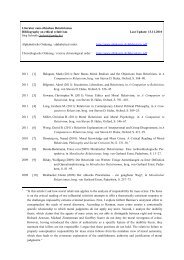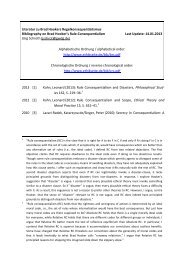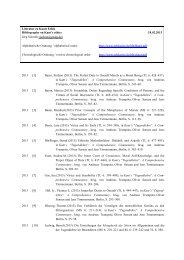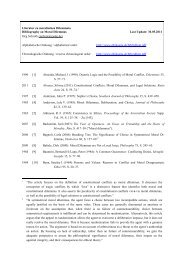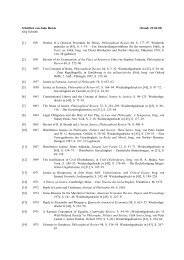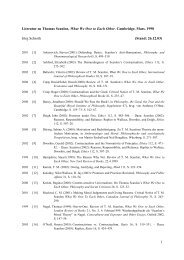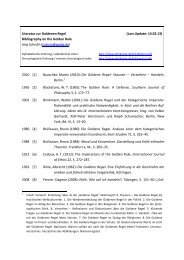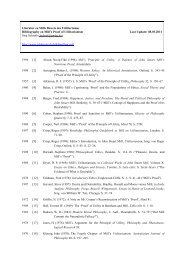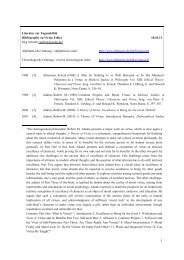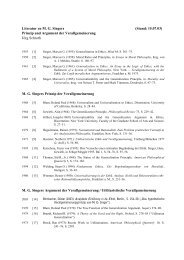Literatur zu Kants Ethik - Ethikseite
Literatur zu Kants Ethik - Ethikseite
Literatur zu Kants Ethik - Ethikseite
Create successful ePaper yourself
Turn your PDF publications into a flip-book with our unique Google optimized e-Paper software.
2011 [350] Greenberg, Robert (2011): On a Presumed Omission in Kant's Derivation of the Categorical<br />
Imperative, Kantian Review 28, S. 449–59. 42<br />
2005 [351] Greenberg, Sean (2005): From Canon to Dialectic to Antinomy: Giving Inclinations Their<br />
Due, Inquiry 48, S. 232–48. 43<br />
1960 [352] Gregor, Mary J. (1960): Kant’s Conception of a “Metaphysic of Morals”, Philosophical<br />
Quarterly 10, S. 238–251.<br />
1963 [353] Gregor, Mary (1963): Laws of Freedom. A Study of Kant’s Method of Applying the<br />
Categorical Imperative in the Metaphysik der Sitten, Oxford.<br />
1990 [354] Gregor, Mary (1990): <strong>Kants</strong> System der Pflichten in der Metaphysik der Sitten, in Immanuel<br />
Kant, Metaphysische Anfangsgründe der Tugendlehre. Metaphysik der Sitten, zweiter<br />
Teil, neu herausgegeben und eingeleitet von Bernd Ludwig, Hamburg, S. XXIX–<br />
LXV.<br />
1993 [355] Gregor, Mary (1993): Kant on Obligation, Rights, and Virtue, Jahrbuch für Recht und <strong>Ethik</strong> 1,<br />
S. 69–102.<br />
2003 [356] Greimann, Dirk (2003): <strong>Kants</strong> Ableitung der Formel des kategorischen Imperativs aus seinem<br />
bloßen Begriff, in Philosophiegeschichte und logische Analyse, hrsg. von Uwe<br />
Meixner und Albert Newen, Band 6: Geschichte der <strong>Ethik</strong>, Paderborn, S. 97–111.<br />
2004 [357] Greimann, Dirk (2004): Ist <strong>Kants</strong> <strong>Ethik</strong> ontologisch unschuldig?, Kant-Studien 95, S. 107–27.<br />
2001 [358] Grenberg, Jeanine M. (2001): Feeling, Desire and Interest in Kant’s Theory of Action, Kant-<br />
Studien 92, S. 153–79.<br />
2005 [359] Grenberg, Jeanine M. (2005): Kant and the Ethics of Humility. A Story of Dependence,<br />
Corruption and Virtue, Cambridge. 44<br />
as primarily involving a willingness to govern one’s conduct by a procedure of impartial co-legislation.<br />
Only the third of these interpretations, I conclude, offers a reasonable and coherent approach to moral<br />
judgment about the limits of commodification.”<br />
42 “A new book by Stephen Engstrom repeats a criticism of Bruce Aune’s of Kant’s derivation of the<br />
universalizability formula of the categorical imperative. The criticism is that Kant omitted at least one<br />
substantive premise in the derivation of the formula: ‘Act only on that maxim through which you can at the<br />
same time will that it become a universal law.’ The grounds for the formula that are given in the<br />
Groundwork of the Metaphysics of Morals, however, are said to support only a weaker requirement, namely,<br />
that a maxim conform to a universal law. Hence, Kant omits at least one necessary substantive premise of<br />
the derivation. This paper attempts to show that nothing substantive is omitted from the argument. It only<br />
needs two principles of inference that it is assumed add nothing substantive to the premises.”<br />
43 “In a recent paper, Eckart Förster challenges interpreters to explain why in the first Critique practical<br />
reason has a canon but no dialectic, whereas in the second Critique, there is not only a dialectic, but an<br />
antinomy of practical reason. In the Groundwork, Kant claims that there is a natural dialectic with respect<br />
to morality (4:405), a different claim from those advanced in the first and second Critiques. Förster's<br />
challenge may therefore be reformulated as the problem of explaining why practical reason has a canon in<br />
the first Critique, a dialectic in the Groundwork, and an antinomy in the second Critique. In this paper, I<br />
answer this challenge. I argue that these differences are due to the different aims and scope of the works,<br />
and in particular, the different place of the inclinations in their arguments.”



